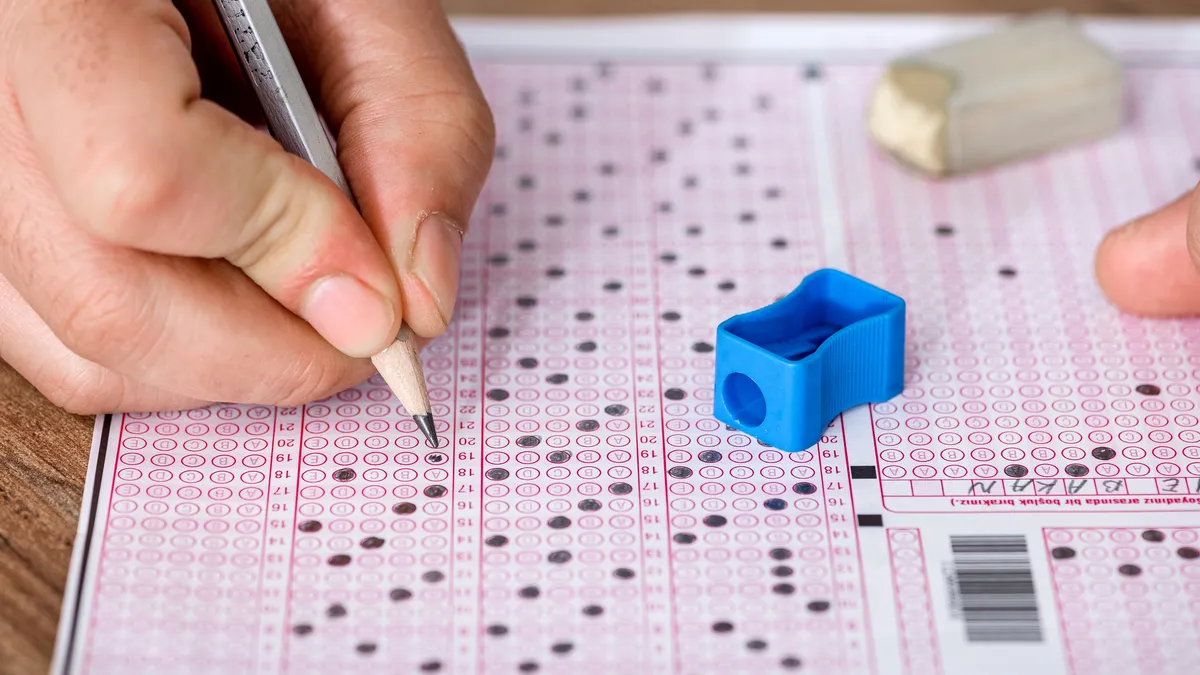Dive Brief:
-
Years after school buildings reopened following COVID-19 closures, an overwhelming majority of public school leaders (92%) are concerned to some extent about their students meeting academic standards, according to data from the National Center for Education Statistics. Out of those, 25% said they are moderately concerned, and 16% said they are extremely concerned.
-
Approximately two-thirds of public school leaders “somewhat" or "strongly" agreed that they support the use of state-mandated testing for math (62%) and English language arts and literacy (66%). About three-quarters "somewhat" or "strongly" agreed that the assessments provide useful data to bolster instruction — 74% for math and 75% for ELA.
-
However, about 67% of public school leaders said math and ELA testing will not accurately measure the ability of students with individualized education plans or who are English learners.
Dive Insight:
The pandemic's negative impact on academics has been well-documented, most notably through a significant decline in national assessment scores. However, state assessment data and studies on testing performance suggest that students are beginning to rebound.
Testing and academic experts have warned, however, that a full rebound is still multiple years away. That sentiment was echoed by administrators in the NCES survey, a third of whom believe that the COVID-19 pandemic will have a “large negative impact” on their students’ performance on state-mandated testing this school year.
“We know that the job of public school leaders has become increasingly complex and there is a constellation of challenges that keep them up at night,” said NCES Commissioner Peggy G. Carr in a Tuesday statement. “It’s a Herculean task to manage all these challenges, and we hope that understanding what school leaders are facing will identify essential areas of support.”
More than 40% of administrators said they “somewhat agree” or “strongly agree” that "the work we will do to prepare our students for the state mandated [subject] test will take time away from other more important classroom work."
Still, administrators' attitudes toward state-mandated testing as a way to bolster instruction stands in stark contrast to speculation during the pandemic that educators would move away from standardized assessments and replace them with through-year or performance-based assessment models.
While a majority of educators supported state-mandated assessments to some degree in the NCES survey, others have suggested a shift away from the annual end-of-year exams.
At least 13 states are exploring through-year assessment models, according to a January 2024 update from the Center for American Progress. Those states include Louisiana, Florida, Texas and Montana. Through-year assessment models have emerged as an alternative to end-of-year exams, with a quicker turnaround time for results and a better ability to inform educators of student progress.
Last year, the U.S. Department of Education gave Montana the green light to replace its existing statewide, federally mandated annual assessment with a through-year assessment beginning in the 2024-25 school year. The aim of the high-profile decision was to "advance student academic achievement, especially in the context of the urgent work of academic recovery post-pandemic,” Adam Schott, deputy assistant secretary for policy and programs in the department’s Office of Elementary and Secondary Education, said at the time.














